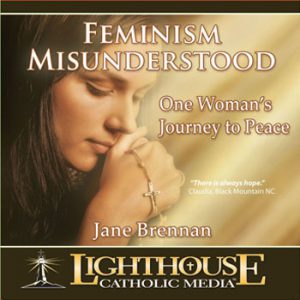Why does God allow us to suffer? This is one of the most important questions of life, and it’s a question God expects us to ask (St. John Paul II, Salvifici Doloris, 10). The first reading says that St. Paul and St. Barnabas “strengthened the souls of the disciples and encouraged them to continue in the faith, saying, ‘It is through many persecutions that we must enter the kingdom of God’” (Acts 14:22). Why is it that we only enter the kingdom through many persecutions? If God loves us, why does He allow bad things to happen to us?
My oldest brother reminded me: this is a deep question. Are we ready for a deep answer? There is no sound-byte answer to this question.
 Some Catholics fall away from God because they can’t understand how God would allow suffering. So, we have to try to answer their questions. We’re going to follow Fr. Robert Spitzer, S.J.’s explanation. For me, it’s the most satisfying and meaningful explanation ever, one that acknowledges the mystery of suffering and also gives direct answers. He says we have to do it in parts, because, even though the answer is actually quite simple, we often don’t get it intellectually, because our hearts aren’t ready. We can’t see it because our vision of reality and life is very limited. So, we’ll start it today and continue for the next three weeks. Through this series, our heavenly Father will encourage us, in the same way that St. Paul and St. Barnabas encouraged the disciples.
Some Catholics fall away from God because they can’t understand how God would allow suffering. So, we have to try to answer their questions. We’re going to follow Fr. Robert Spitzer, S.J.’s explanation. For me, it’s the most satisfying and meaningful explanation ever, one that acknowledges the mystery of suffering and also gives direct answers. He says we have to do it in parts, because, even though the answer is actually quite simple, we often don’t get it intellectually, because our hearts aren’t ready. We can’t see it because our vision of reality and life is very limited. So, we’ll start it today and continue for the next three weeks. Through this series, our heavenly Father will encourage us, in the same way that St. Paul and St. Barnabas encouraged the disciples.
Let’s keep one thing in mind: some Catholics leave the Church because they don’t understand why God allows suffering. But, if they embrace agnosticism or atheism, do they find a better answer? Atheists have no answer to the problem of suffering. When there’s a big tragedy, is there ever a big atheist service that tries to console people and give meaning? (Dinesh D’Souza, What’s So Great About Christianity?, 278-9). Only God and faith can provide a full answer.
The first part in answering the question is recognizing that there are four levels of happiness in life. If we only live for immediate happiness, suffering will make no sense. If there’s greater happiness in the world, then we can start to understand it.
 What’s level one happiness? It’s pleasure and material happiness. It can come from buying stuff (electronics, cars, clothes); it feels pretty good, doesn’t it, when we go to our favourite store, spend a few hours and then come out with exactly what we want? We feel like our day was fulfilling. It can come from riding in a Mercedes S-class with leather, feeling that German engineering. The happiness here is immediate, but doesn’t last: When we eat, we feel pleasure. When we’re done eating, the pleasure is over, which is why we never stop eating.
What’s level one happiness? It’s pleasure and material happiness. It can come from buying stuff (electronics, cars, clothes); it feels pretty good, doesn’t it, when we go to our favourite store, spend a few hours and then come out with exactly what we want? We feel like our day was fulfilling. It can come from riding in a Mercedes S-class with leather, feeling that German engineering. The happiness here is immediate, but doesn’t last: When we eat, we feel pleasure. When we’re done eating, the pleasure is over, which is why we never stop eating.
 What’s level two? Ego satisfaction. We feel greater happiness because we’ve achieved a lot in life, we’re smart, good looking, successful, and liked by other people. People tell to us, for example, “Wow! You’re such a good musician,” and we think, “Thanks so much. Can you tell me more about myself?” Consciously or not, we’re all very aware of how we’re perceived by other people: whether they like us or not, whether we look good or not, fit in or not. And, in particular, we get a lot of satisfaction knowing that we’re better in comparison to other people. Among our circle of family and friends, we’re happy to have the better house, to be the first to get that new phone, to be the best in our field, to have more degrees and awards, etc. And we love winning!
What’s level two? Ego satisfaction. We feel greater happiness because we’ve achieved a lot in life, we’re smart, good looking, successful, and liked by other people. People tell to us, for example, “Wow! You’re such a good musician,” and we think, “Thanks so much. Can you tell me more about myself?” Consciously or not, we’re all very aware of how we’re perceived by other people: whether they like us or not, whether we look good or not, fit in or not. And, in particular, we get a lot of satisfaction knowing that we’re better in comparison to other people. Among our circle of family and friends, we’re happy to have the better house, to be the first to get that new phone, to be the best in our field, to have more degrees and awards, etc. And we love winning!
Let’s point out right away that both levels one and two are good. Pleasure and material things are good. Achievement, intelligence, beauty can all be used for God’s kingdom. Credibility comes from status, so we should have some; material well-being gives security; we shouldn’t cower at every competitor that comes along, so we must have some experience of winning.
But there’s a big problem. What happens when pleasure is taken away? If we find happiness mainly from buying stuff and having fun, then, once that fun is gone, we’re unhappy. As soon as we’re not entertained and stimulated, we get… bored. When the 2010 Olympics finished, after two weeks of exhilaration and excitement, there was a post-Olympics depression. This is not a great way to live. If level one happiness is our purpose in life, we won’t achieve much or contribute much, because we’ll never make sacrifices to get better at anything.
 There’s also a big problem with level two happiness as our main kind of happiness. If we’re focused on achieving more, moving ahead in work, and winning, what happens when we lose? What happens when people criticize us? It seems to me that most people are too sensitive. When someone points out a flaw in our character, the way we did something, or suggests how we can improve, we feel down. Our egos are too sensitive.
There’s also a big problem with level two happiness as our main kind of happiness. If we’re focused on achieving more, moving ahead in work, and winning, what happens when we lose? What happens when people criticize us? It seems to me that most people are too sensitive. When someone points out a flaw in our character, the way we did something, or suggests how we can improve, we feel down. Our egos are too sensitive.
Fr. Spitzer makes an amazing observation: when level two happiness is our dominant way of living, we play a comparison game. Feelings of jealousy, inferiority, sometimes anger and depression come because we’re losing in comparison to other people. We feel less worthy, that we’ve been dealt a bad hand, like our lives don’t amount to anything. These feelings are not fun. If the only thing that matters in life is level two, don’t be a loser!
But even if we compare ourselves to other people and are about the same, we still fear losing people’s respect, fear taking a test, an athletic event, fear that people will find out how old we are, our physical defects, our weight, our real intelligence. We fear being embarrassed. We sometimes get intimidated by people who are good at everything: they’re smart, strong, beautiful, and successful. Now some of this is perfectly natural, but when we make this the purpose of life, it becomes a neurotic, debilitating kind of fear.
But let’s say we actually win the comparison game. In this state, we still can’t plateau, because we don’t want to lose. Little mistakes have disproportionate consequences. You mispronounce a word and then everyone thinks you’re an idiot and then you go home, play the tape over a thousand times and have suicidal thoughts? That’s an insane kind of life. When people don’t give us attention and praise, then we feel resentful. Ultimately, even when we win, there’s still a certain kind of emptiness.
Level one and two aren’t bad, but they’re terrible as ends in themselves. If our only objective in life is having fun and doing well, we’ll suffer a lot. Fr. Spitzer says that 70% of us default to levels one and two as the only things that make us happy. Why? Because we’ve never been shown the menu: we don’t even know there are levels three and four.
What are they? Level three is contributive happiness. When we listen to a friend, pray for another person, do things at home for our family, when we help strangers, stand up for the innocent and abused, donate to a charity or cause, help people at work, we feel a happiness that touches every part of our being, that lasts a long time, and this happiness actually spreads to everyone around us.
 Domino’s Pizza grew to a billion-dollar company under Thomas Monaghan, a Catholic raised by Polish nuns in an orphanage. He started as a simple, hard-working man but became so successful that he was obsessed with all the toys, with his own jet, helicopter, and yacht.
Domino’s Pizza grew to a billion-dollar company under Thomas Monaghan, a Catholic raised by Polish nuns in an orphanage. He started as a simple, hard-working man but became so successful that he was obsessed with all the toys, with his own jet, helicopter, and yacht.
One day he read Mere Christianity by C.S. Lewis, and the chapter on pride hit him right between the eyes. He always knew he had a lot of pride, being so obsessed with impressing people. The book explained that the reason we work so hard, try to accomplish so much, is to have more, not just more, but more than other people. That night he couldn’t sleep.
After reading the book, he decided to give up the toys, to take a millionaire’s vow of poverty. After 38 years of running Domino’s Pizza, he sold it in 1998 for one billion dollars. He wanted his money to go where it would do the most good, to save the most souls, and he narrowed it down to higher education, and felt a calling, an obligation, to start a Catholic university from scratch, living in a dormitory. He’s going to die broke, having taken on commitments that are going to exhaust his resources. It’s not that he doesn’t like money or the things that money can buy, but he wants to go to heaven and bring as many people with him by using his money to build the kingdom. He says, “Right now, my life is so right for the way God made me. I believe I’m doing exactly what God wants me to do and I feel so privledged that he gave me the wisdom to see it.”
Even when we experience this kind of contributive happiness, the human person still desires more. Level four is the desire for the ultimate, unconditional, and perfect truth, love, goodness, beauty and being—this is the happiness found in God, in prayer. To understand suffering, we need to know that we’re called to eternal life (not just this finite life), called to the unconditional love and joy of Trinity, in a symphony of love with every other person. This is the eternal perspective.
Jesus said, “I came that they may have life, and have it abundantly” (Jn 10:10). He wants us to experience happiness at all levels, but in proper order. First, our happiness is ultimately found in God, then in helping other people, then achieving things, and finally, in enjoying material things. The world inverts this, focusing on immediate gratification and ego highs, leaving no room for humble service and the transcendent.
So many of us have achieved so much, but there’s got to be more. There’s only so much the world can give us. We’re made for more. When we make level three and four our purpose in life and identity, there’s freedom: feelings of jealousy, fear, and comparison go. We don’t have to worry about being embarrassed or failing because we’re not here to satisfy our ego or compare ourselves to others. We’re here to love God and other people—that’s it.
How do we live for levels three and four? One way is simply ask, “How can I best love God, my family, friends and people around me?” Whatever we come up with, we simply add to it, “…for this I came.” For example, today I think, “I’m going to be extremely patient with my family—for this I came. I’m going to be very joyful at work today, so as to cheer up the people around me—for this I came.” Just thinking this way will move us up.
 Let’s finish with a story of moving from levels one and two to level four: Jane Brennan grew up in New Jersey and had an extremely difficult childhood: she was molested by her grandfather when five years old, and no one in her family wanted to talk about it. It happened again by another relative, by a neighbourhood boy, and then by a stranger. She felt unloveable and had no idea how to deal with the pain and despair. She started drinking when she was ten, smoking marijuana when twelve, and having sex when eighteen. Though she was Catholic, she knew nothing about our faith and never knew that God was loving. She had her first abortion in college, then moved in with an abusive and controlling boyfriend, and had another abortion. She was so desperate to be loved and “always searching for that perfect high,” but was usually depressed, crying, and feeling empty.
Let’s finish with a story of moving from levels one and two to level four: Jane Brennan grew up in New Jersey and had an extremely difficult childhood: she was molested by her grandfather when five years old, and no one in her family wanted to talk about it. It happened again by another relative, by a neighbourhood boy, and then by a stranger. She felt unloveable and had no idea how to deal with the pain and despair. She started drinking when she was ten, smoking marijuana when twelve, and having sex when eighteen. Though she was Catholic, she knew nothing about our faith and never knew that God was loving. She had her first abortion in college, then moved in with an abusive and controlling boyfriend, and had another abortion. She was so desperate to be loved and “always searching for that perfect high,” but was usually depressed, crying, and feeling empty.
Eventually, even though she became an anti-Catholic feminist, she married a Catholic. They were blessed with a little girl, and then twins, and she started to question how she was living and see flaws in the radical feminist movement. She realized she needed religion so she started going to churches, but something was missing. She kept searching, and her husband, the Catholic, said, “Look, if you’re going to go back to church, the only church I’m going to go to is the Catholic Church.” She was ready to argue with him, but something held her back. In her mind, she was going to try it and then look for the real church.
That Sunday, she took her oldest daughter with her and found a Catholic church. When she approached the front door, she stopped, thinking “What am I doing here? I can’t go in there. That’s a Catholic Church.” But she felt like she had a magnet inside her drawing her inside—that’s how strong it was. So she entered, stood at the back (the Mass had already began), and this feeling came over her like “I’m finally home.” This shocked her, bringing tears to her eyes. An usher came up to her and asked if she wanted a seat. She said, “Yes,” so he took her all the way up front. As she stood there with everyone else, listening to the priest offer Mass, all of sudden this beam of power from above came down, hit here on her head, and knocked her to her knees. She says, “’At that moment, I knew there was a God, that Jesus Christ was His son, this was His church, and He wanted me here.’ I just started to sob. My daughter said, ‘Mommy, what’s wrong?’ And I just looked up at her and said, ‘I’m so happy!’ And I was! After all those years of searching and searching for happiness and love… I finally finally find it in the last place that I ever expected to find anything… I was just filled with this incredible joy” (Jane Brennan, Feminism Misunderstood, Track 8).